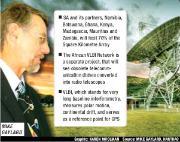
Radio astronomy is one area where the continent is pushing scientific engagement, writes Sarah Wild
How long will Africa remain a consumer society only, ponders Kofi Ashilevi, director of the fledgling Ghana Space Science and Technology Centre. “Do the sceptics think Africa does not have people with intellectual capabilities to do real science?”
The director had been asked whether African countries could justify science training and infrastructure, when there was pressure to deliver basic services. Ghana and Kenya, with the help of SA, are pioneering radio astronomy in Africa by converting old and obsolete communications dishes into radio telescopes, with other countries showing increased interest.
However, the decision that SA and its partner countries — Namibia, Botswana, Ghana, Kenya, Madagascar, Mauritius, Mozambique and Zambia — will host 70% of the €3bn Square Kilometre Array (SKA), has changed perceptions about the continent’s ability to do science, and increased African countries engagement with science.
But the African VLBI Network, which is what the project is being called, is separate from the SKA, but will lay the groundwork for the leviathan telescope, says SKA associate director Anita Loots, who is leading the project. Last year, the African Renaissance Fund agreed to put R120m towards the project.
With four radio telescopes, the continent will be able to have its own VLBI network, “and then we can own all the science”, Ms Loots says. The African VLBI Network is based on very long baseline interferometry — a radio astronomy technique which involves observing a single object through a number of telescopes simultaneously, so that all the telescopes act in effect as one very big telescope.
SA has been involved in international VLBI networks since the 1970s, with its dish at Hartebeeshoek Radio Astronomy Observatory (HartRAO) in Gauteng. HartRAO MD Mike Gaylard says: “We (the observatory) are the reference point for the survey system in SA.
“We measure continental drift; we are critical for geography, measuring polar motion and where all the continents are going; as well as providing an absolute reference for all GPS stations in Southern Africa.”
Mr Gaylard initially located the dishes for possible conversion in 2008. “We have talked about how radio astronomy is boosting hi-tech and human capital development in SA. It can do the same in those countries.”
Mr Ashilevi says that Ghana’s telescope is progressing “very well”. Vodafone gave the 32m communications dish in Kuntunse to the Ghanaian government, and while SKA is helping Ghana to convert its dish, it remains a Ghanaian owned and operated project, Ms Loots says.
Mr Ashilevi says his government has put $5m towards the development of the telescope.
“It will be their facility, not ours,” she says, adding that SA will also help with training.
Mr Ashilevi cites human capital as a challenge, but notes that engineers and technicians have been trained in Ghana and SA.
Kenya’s chief science secretary in their National Council for Science and Technology Simon Langat says that Kenya’s radio astronomy plans have the same problem: “The main challenge (is) developing adequate human capacity to create a strong forward push for such a new area of scientific engagement. It takes time to build human capacity.”
However, Kenya’s plans are not as advanced as Ghana’s, and were in “the negotiation stage”, Mr Langat says.
Since 2005, the SKA SA human capital development programme has disbursed 425 bursaries, with a number of them going to candidates from other African countries.
Construction on phase one of the SKA will begin in 2017.
“We are also paving the way for everything related to customs and duties, visas, excise,” Ms Loots says. “We are fault-finding before the SKA. At this point, it is partner countries only, so that we can roll out the SKA without any pain.” But there is a great deal of interest from non-SKA partner countries, she says.
Wild, a Rhodes Alumnus, is author of popular science book Searching African Skies: The Square Kilometre Array and South Africa’s quest to hear the songs of the stars. It was published by Jacana Media last year.
Written by: Sarah Wild
Picture credit: Business Day
- Sarah Wild is a Rhodes University graduate. This article was published on Business Day.
